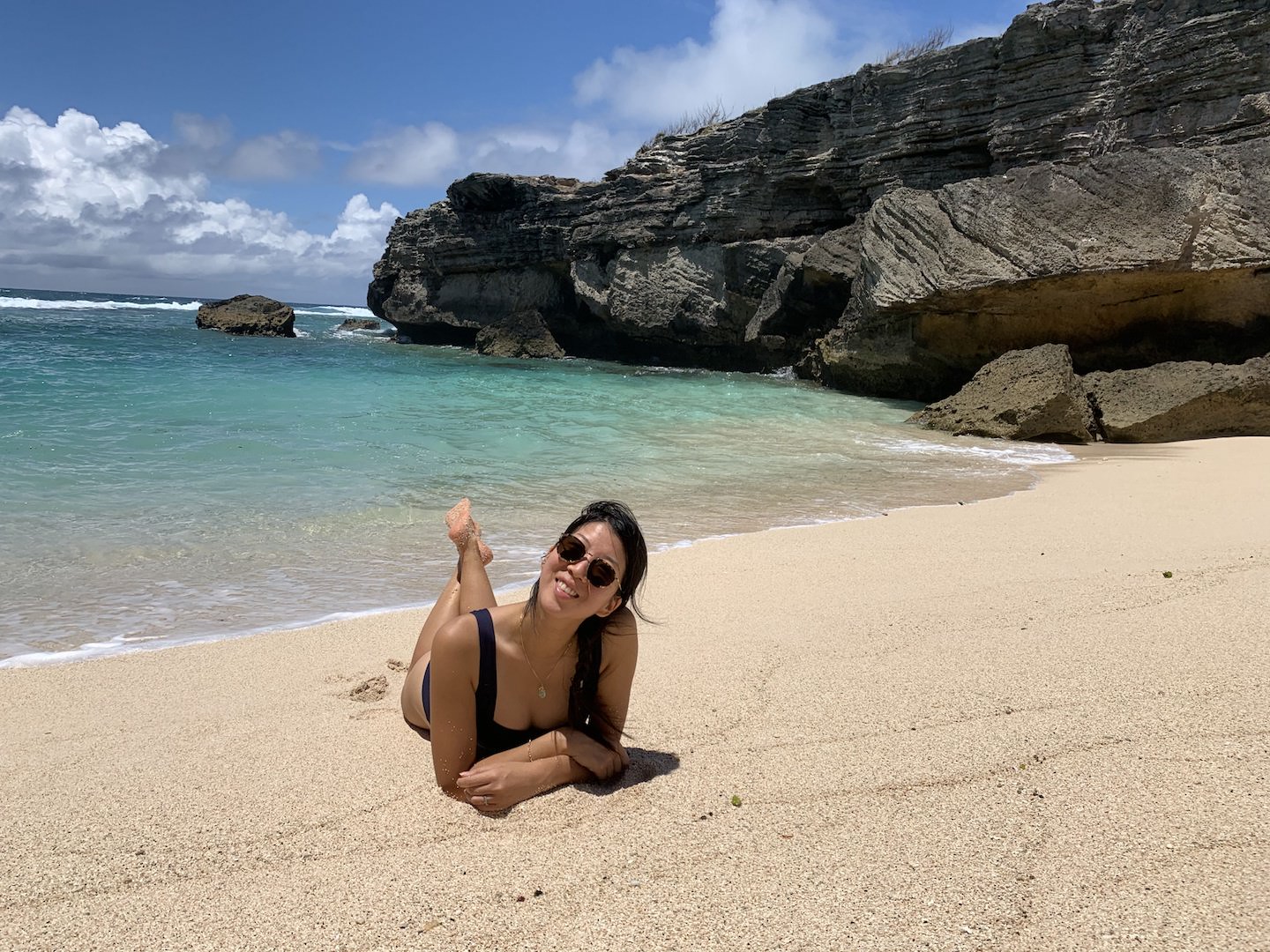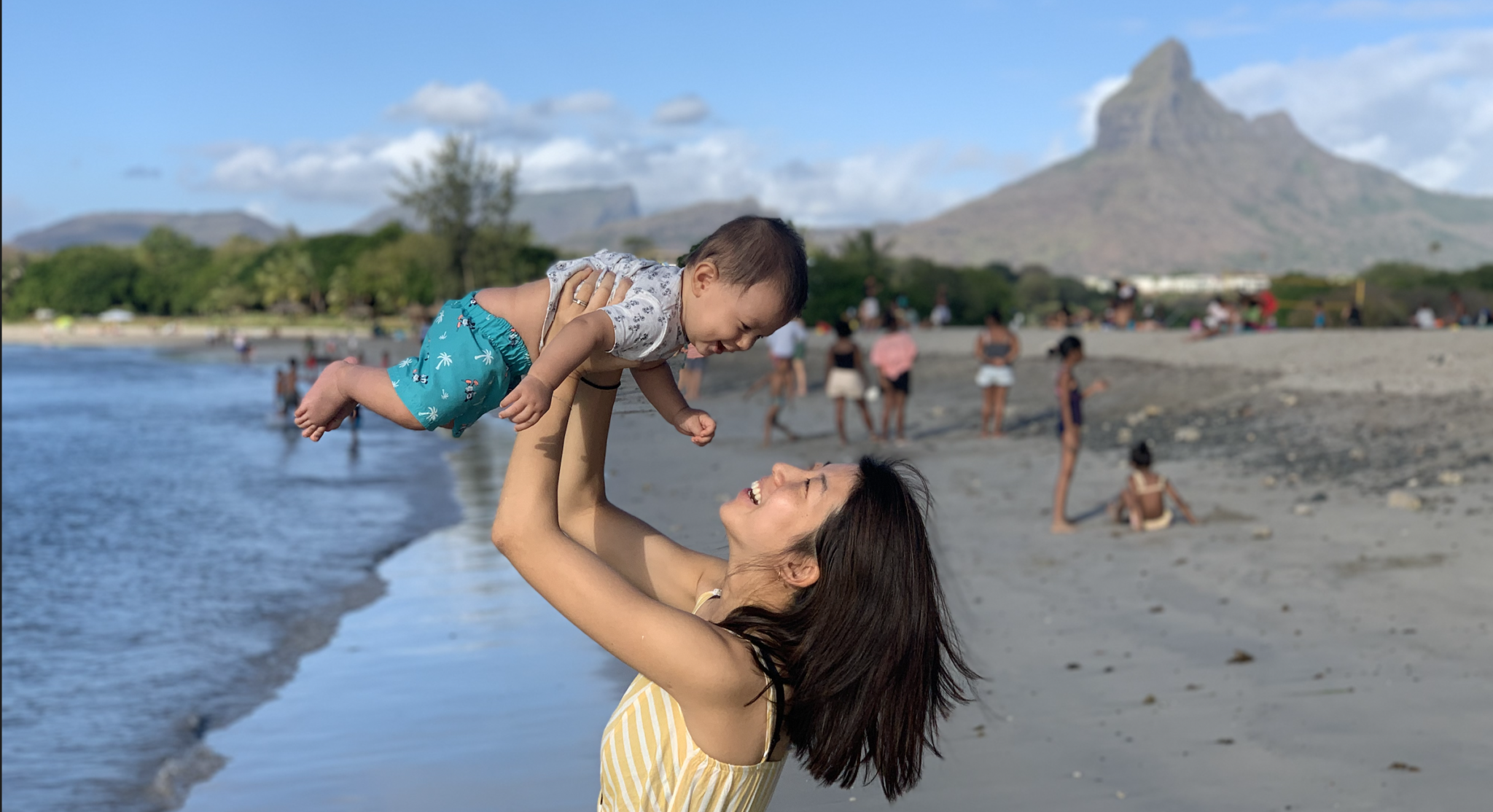Les questions dans cette interview :

1. Can you briefly introduce yourself and tell us what motivated you to move to Mauritius?
Hello, I’m Jules, French and mom of 2 little boys. Originally from the Paris region, I moved to Mauritius in 2018.
Having arrived as a 2-person family with my husband, there are now 4 of us + dog and cat, and I talk about my expatriation and my daily life through my blog FromParisToMoris.com and my social networks.
And why Mauritius?
To tell the truth, this destination wasn’t on my initial list! I’ve always loved to travel, and I’d been wanting to move abroad for some time. My husband and I were thinking of leaving Paris, but Mauritius was a bit of a coincidence. My husband got to know a French expatriate in Mauritius on a professional level. He asked him a few questions about life there, cultural differences, purchasing power… He dug a little deeper into his job search, and landed a position in consulting. Life in the tropics, why not?
2. What was it like to become a mother in Mauritius?
A truly unique experience! I’m one of the first mothers in my circle of friends. I hadn’t had much feedback on motherhood in general, and even less on motherhood in Mauritius.
It was a discovery. I was able to count on my husband and family (despite the distance) in this initiatory journey.
What’s more, my eldest son was born in the middle of Covid. We were in a bubble in Mauritius, isolated / preserved from the outside world if you can describe it that way.
I chose to give birth in Mauritius and to be accompanied by a Mauritian practitioner, which was quite atypical for many French women living here. Most of the people I spoke to preferred to give birth in France. A choice I can understand.
3. What were the biggest challenges you faced raising young children in Mauritius? How did you overcome them?
One of the biggest challenges is undoubtedly the absence of family. In this kind of event, it’s true that you want to be surrounded by your loved ones. Now that communication channels are so widely developed, distance is less of an issue (not to mention the 2/3-hour time difference with France).
The Covid was another challenge, but one that also enabled us to fully experience the birth and first months of our son. With the various confinements, family life was very intense, but as it is for many people.
Fortunately, I was lucky enough to have a nanny with me. She was able to support and advise me in this new chapter of my life. This enabled me to return to the office smoothly and with greater serenity.
My second child came along very quickly, and I have to admit that managing two young children is no mean feat. One of the good things about living in Mauritius is the help available on a daily basis. I’ve been able to surround myself with trustworthy people at very reasonable prices. I’d like to thank my nannies and housekeepers who help me a lot in my daily life. I realize that this is a real luxury and that in France I might not have been able to afford it.

4. Can you share your experience of healthcare services in Mauritius, particularly as regards pregnancy, childbirth and paediatric care?
An important point to bear in mind when leaving France is that you are also leaving the French social security system and the quality of French healthcare. In Mauritius, hospital treatment can quickly become expensive, so you need to take out health insurance and/or a mutuelle such as CFE.
As far as health care is concerned, and particularly during my pregnancy, I was followed by a very well-known gynecologist here, Haroon Beebeejoon (in short: everyone knows him). I asked him all the questions I had as a foreigner, such as whether Caesarean sections were systematic, whether abortion was possible in the event of illness, and how to choose my delivery clinic.
When it comes to childbirth, the choice of location depends on where the practitioner practises. My gynecologist works in 2 clinics, so I was able to visit them to make my choice.
The birth went well, my husband was able to attend and I didn’t have to wear a mask during labor (#covid). The midwives were very patient and attentive, accompanying me throughout, and the gynecologist joined us at the end of labor.
For paediatric care, I had a few recommendations from Mauritian friends and colleagues.
On top of that, we’re lucky enough to have a pediatrician in our family circle in France, which means we can talk a lot about medical practices and advice given here. There are many anecdotes of bad experiences in Mauritius, so it’s best to be well informed about the practitioners you choose.
I have written a full article on my pregnancy and childbirth in Mauritius.
5. How do you manage your children’s education? Do you want them to grow up bilingual or multilingual?
My husband and I are constantly questioning the education of our children, and in particular the languages spoken: French, English and Mauritian Creole.
The main language spoken is French. However, all administrative matters are dealt with in English. And the children quickly become bilingual, thanks to the local education system.
Of course, we’d like them to be bilingual in French and English, and why not add Mandarin because of my Chinese origins.
As for Mauritian Creole, my husband and I wanted the nanny not to hesitate to use Creole so that our child could learn it. There aren’t many French people who speak Creole, which is a shame, because I think it makes cultural immersion easier. Having said that, Creole is a mainly oral language, and much freer than French, where spelling and grammar are very important.

6. What type of network have you found or created in Mauritius for expatriate parents? Are there any groups, associations or communities that you would recommend?
Working in a Mauritian company at the time, I was able to get lots of advice and tips from my colleagues. I was also able to ask them all my questions about how local health insurance worked, maternity leave, vaccinations and returning to work. That’s why, in 2020, I created my blog to share my experience and help others with similar questions.
When we first arrived in Mauritius, we attended Expat.com evenings. Since then we’ve formed a mixed group of friends (French and Mauritians) who we’ve met along the way.
It’s also worth noting that it’s easier to integrate with expat families from all walks of life, with whom we share many similarities. In fact, in addition to our desire to get away to the sun, the distance between our families means that we can quickly forge links between expats.
7. How do you see your children’s education in Mauritius? Do you prefer international schools, local schools or home schooling?
Depending on our professional activity, we plan to stay in Mauritius for a few more years, and the question of the school soon arose. We hesitated for a long time between international schools and local French schools. I talked a lot with my mom friends, who gave me feedback on their children’s schools. The cost of these schools is not negligible compared to local schools. These private school fees represent a real budget that absolutely must be taken into consideration when planning an expatriation.
In all cases, we pre-registered our children in a number of different establishments, giving us time to think about the final choice.
For the time being, we prefer French education in the island’s AEFE schools. English is a subject that is emphasized from an early age here, more so than in France.
As the children are still small, we have enrolled them in Mauritian nurseries and kindergartens because of their proximity to where we live. In fact, we’re thinking of moving to be closer to the schools, as my husband and I both work from home.
8. What family or children’s activities would you recommend in Mauritius? Are there any places or experiences that your children particularly enjoy?
Mauritius is a great destination for young children, with its sunny climate and mild temperatures. As well as the beach, children love to go for walks, whether in the park next door, Jardin de Pamplemousses, or take the metro express to Port Louis at weekends.
One of the kids’ favorite activities is Casela, Mauritius’ zoo located near Flic-en-Flac. With our resident membership card, we can go there any day of the year if we feel like it. The place is gigantic, and you can choose between seeing the turtles, the savannah animals or the farm animals. Or you can simply go and enjoy the playground with its slides, swings, zip line and mini-golf, and have a coffee in the nearby restaurant.
There’s also the Vanille Nature Park zoo in the south of the island, where children love to visit the crocodiles. Otherwise, on bad weather days, there’s the Odysseo oceonarium in Port Louis or indoor playgrounds like Gravity at Tribeca Mall or Koala Happy Island at Phoenix Mall.
My article listing all the activities you can do with the kids.
9. What advice would you give to other families thinking of moving to Mauritius, especially those expecting or with young children?
Mauritius as a family: it takes preparation. It’s important to be well-informed before moving to Mauritius, as the cost of living is based on our habits. Today, our quality of life is much better than if we’d stayed in Paris. But this comes at a cost: private school education, health insurance, organic produce, electronics and other French products are also more expensive than in France.
In addition to the gentle way of life, the hospitality, mutual aid and benevolence of Mauritians are one of the main reasons why we are happy to live here.
I recommend that you come on vacation for the first time and see if life here seems feasible. If you’re a couple, it’s important that both parties are happy, as it’s a joint project.
If you’d like me to accompany you, please don’t hesitate to contact me.
If these reasons have convinced you to come too, find out all about the visas that will enable you to try your hand at adventure: article here.